特殊疑问词详解与特殊疑问句练习
- 格式:doc
- 大小:112.00 KB
- 文档页数:6
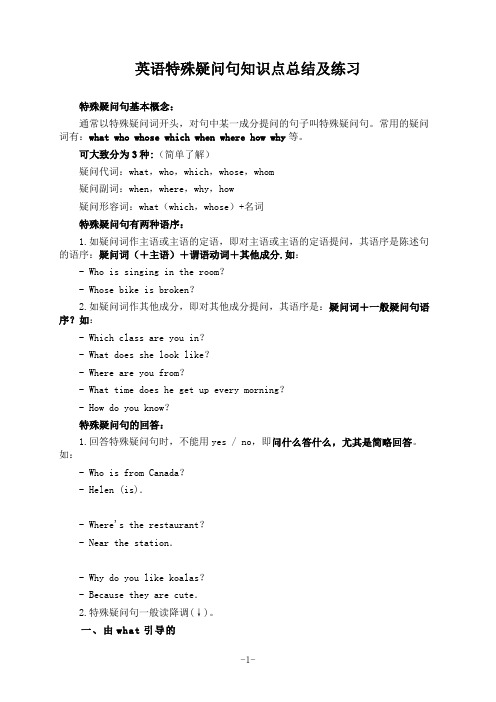
英语特殊疑问句知识点总结及练习特殊疑问句基本概念:通常以特殊疑问词开头,对句中某一成分提问的句子叫特殊疑问句。
常用的疑问词有:what who whose which when where how why等。
可大致分为3种:(简单了解)疑问代词:what,who,which,whose,whom疑问副词:when,where,why,how疑问形容词:what(which,whose)+名词特殊疑问句有两种语序:1.如疑问词作主语或主语的定语,即对主语或主语的定语提问,其语序是陈述句的语序:疑问词(+主语)+谓语动词+其他成分.如:- Who is singing in the room?- Whose bike is broken?2.如疑问词作其他成分,即对其他成分提问,其语序是:疑问词+一般疑问句语序?如:- Which class are you in?- What does she look like?- Where are you from?- What time does he get up every morning?- How do you know?特殊疑问句的回答:1.回答特殊疑问句时,不能用yes / no,即问什么答什么,尤其是简略回答。
如:- Who is from Canada?- Helen (is).- Where's the restaurant?- Near the station.- Why do you like koalas?- Because they are cute.2.特殊疑问句一般读降调(↓)。
一、由what引导的注释:what即“什么”,属于高频使用的特殊疑问题。
(一) What + 系动词 + sb/sth?1、询问“是什么”What's that? It's an apple.那是什么?那是一个苹果。
What's it in English? It's an orange.它用英语怎么说?它是一个orange。
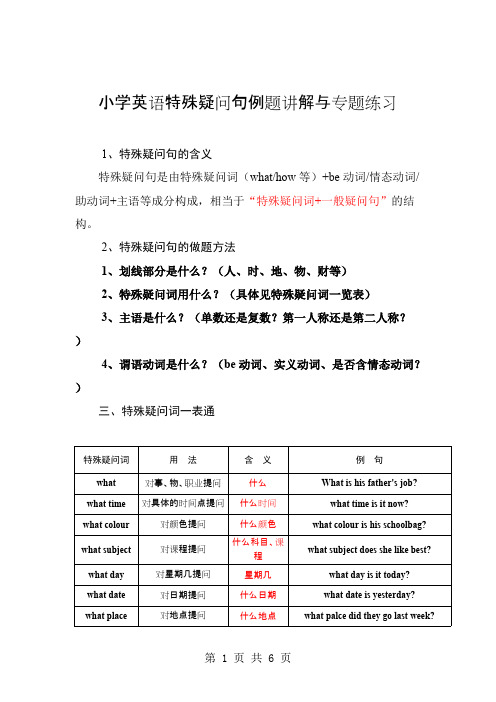
小学英语特殊疑问句例题讲解与专题练习1、特殊疑问句的含义特殊疑问句是由特殊疑问词(what/how等)+be动词/情态动词/助动词+主语等成分构成,相当于“特殊疑问词+一般疑问句”的结构。
2、特殊疑问句的做题方法1、划线部分是什么?(人、时、地、物、财等)2、特殊疑问词用什么?(具体见特殊疑问词一览表)3、主语是什么?(单数还是复数?第一人称还是第二人称?)4、谓语动词是什么?(be动词、实义动词、是否含情态动词?)三、特殊疑问词一表通特殊疑问词用法含义例句what对事、物、职业提问什么What is his father's job?what time对具体的时间点提问什么时间what time is it now? what colour对颜色提问什么颜色what colour is his schoolbag?what subject对课程提问什么科目、课程what subject does she like best?what day对星期几提问星期几what day is it today? what date对日期提问什么日期what date is yesterday? what place对地点提问什么地点what palce did they go last week?who对人提问谁who is that guy beside Tom? whose对所有格提问谁的Whose mobile phone is it? when对时间提问什么时候when dose the football game begin? where对地点提问哪里Where could you go?why对原因提问为什么Why did it cry?which对选择提问哪一个Which is your favourite?how对形容词提问怎么样How is your school?how many对数量提问多少How many e-friends do you have? how much对价格提问多少钱How much is the golden pen? how far对路程提问距离多远How far is the park from your house? how long对一段时间提问时间多长How long could Tom get there? how often对频率提问多久一次How often do you go shopping? how old对年龄提问多大年龄How old is your mother?how soon对多快(时间)提问多快How soon could he run?四、对划线部分提问练习题1. Mike makes cars in a factory .(对划线部分提问)?2. Daniel has a lot of hobbies .(对划线部分提问)?3. His father is a writer . (对划线部分提问)?4. My sister likes dancing .(对划线部分提问)?5. The girl under the tree is my sister .(对划线部分提问)?6. My uncle can teach me Chinese .(对划线部分提问)?7. The pen costs me 10 yuan .(对划线部分提问)?8. Jack’s house is 1 km from our school .(对划线部分提问)?9. There are three people in my family .(对划线部分提问)?10. The girl is so beautiful .(对划线部分提问)?11. Mike often goes to school on foot .(对划线部分提问)?12. It’s 7 o’clock now .(对划线部分提问)?13. Mike plays table tennis three times a week .(对划线部分提问)?14. That man is my English teacher .(对划线部分提问)?15. My e-friend comes from the UK .(对划线部分提问)?16. Millie and I will go to the library tomorrow .(对划线部分提问)?17. My parrot is yellow and green .(对划线部分提问)?18.He goes to bed because he is too tired .(对划线部分提问)?19 . Tomorrow is Wednesday .(对划线部分提问)?20 . We are going to Australia On September 1st.(对划线部分提问)?21 . The schoolbag is mine .(对划线部分提问)?22 . My grandmother is 76 years old .(对划线部分提问)?五、用特殊疑问词填空1、do you like best ? - I like go fishing best .2、do you like best ? - I like the green colour best .3、do you like best ? - I like Lily best.4、do you like best ? - I like that museum best .5、do you like ? - I like the tallest one .6、book do you like best ? - I like Tom’s book best .7、is your school? - My school is big and beautiful .8、do you play football ? - We play football every week .9、do you get up ? - I get up at half past six in the morning .10、is your father? - My father is 36 years old .参考答案:第五题1.where does Mike make cars?2.How many hobbies does David have ?3.What is his father job?/What does his father do ?4. What does your sister like ?5.Who is the girl under the tree ?6.What subject can your uncle teach ?7.How much is the pen ?8.How far is Jack’s house from your school ?9.How many people are there in your family?10.How is the girl ?11.How does Mike often go to school ?12.What time is it now ?13.How often does Mike play table tennis ?14.Who is that man ?15.Where does your e-friend come from ?16.When will Millie and you go to the library ?17.What colour is your parrot ?18.Why does he go to bed ?19. What day is tomorrow ?20.What date are your going to Australia?21.Whose schoolbag is it ?22.How old is your grandmother ?第六题1.what2.what colour3.who4.where5.which6.whose7.how8.how often9.when/what time 10.how old。
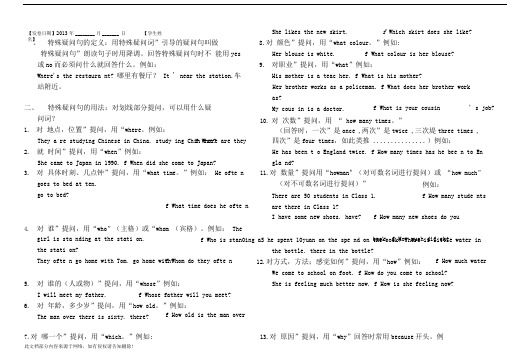
【发卷日期】2013年 ________ 月 _______ 日 【学生姓名】、 特殊疑问句的定义:用特殊疑问词”引导的疑问句叫做 特殊疑问句”朗读句子时用降调。
回答特殊疑问句时不 能用yes 或no 而必须问什么就回答什么。
例如: Where's the restaura nt? 哪里有餐厅? It ' near the station.车站附近。
二、 特殊疑问句的用法:对划线部分提问,可以用什么疑 问词? 1. 对 地点,位置”提问,用“where 。
例如: They a re studying Chinese in China. study ing Chin ese? 2. 就 时间”提问,用“when ”例如: She came to Japan in 1990. f When did she come to Japan? 3. 对 具体时刻、几点钟”提问,用“what time 。
”例如: He ofte ngoes to bed at ten. go to bed?She likes the new skirt. f Which skirt does she like?8.对 颜色”提问,用“what colour 。
”例如: f What colour is her blouse?9. 对职业”提问,用“what ”例如:His mother is a teac her. f What is his mother?Her brother works as a policeman. f What does her brother work as?My cous in is a doctor.Her blouse is white.f What is your cousin' s job?10. 对 次数”提问,用 “ how many times 。
”f Where are they (回答时,一次”是once ,两次”是twice ,三次堤three times ,四次”是four times ,如此类推 ............... )例如:He has been t o England twice. f How many times has he bee n to En gla nd?11.对 数量”提问用“howman^ (对可数名词进行提问)或 “how much”(对不可数名词进行提问)”f What time does he ofte n4. 对 谁”提问,用“who”(主格)或“whom (宾格)。
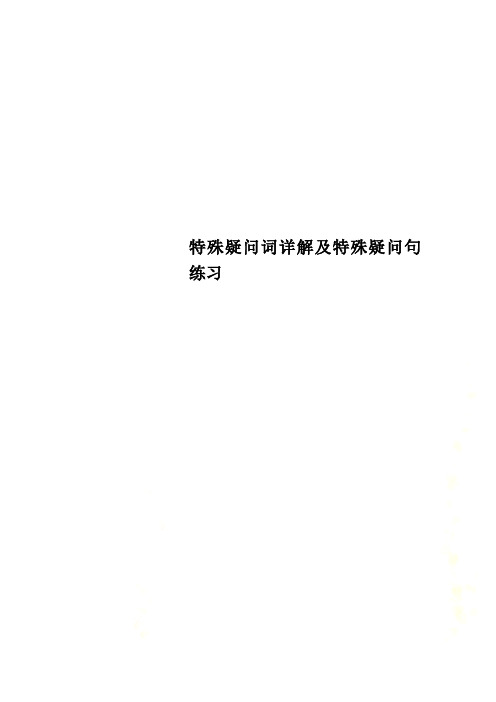
特殊疑问词详解及特殊疑问句练习一、特殊疑问句的定义:用“特殊疑问词”引导的疑问句叫做“特殊疑问句”,朗读句子时用降调。
回答特殊疑问句时不能用yes或no而必须问什么就回答什么。
例如:Where's the restaurant? 哪里有餐厅?It’s near the station. 车站附近。
二、特殊疑问句的用法:对划线部分提问,可以用什么疑问词?1.对“地点,位置”提问,用“where”。
例如:They are studying Chinese in China. → Where are they studying Chinese?2.就“时间”提问,用“when”。
例如:She came to Japan in 1990. → When did she come to Japan?3.对“具体时刻、几点钟”提问,用“what time”。
例如:He often goes to bed at ten. → What time does he often go to bed?4.对“谁”提问,用“who”(主格)或“whom”(宾格)。
例如:The girl is standing at the sta tion. → Who is standing at the station?They often go home with Tom. → Whom do they often go home with?5.对“谁的(人或物)”提问,用“whose”。
例如:I will meet my father. → Whose father will you meet?6.对“年龄,多少岁”提问,用“how old”。
例如:The man over there is sixty. → How old is the man over there?7.对“哪一个”提问,用“which”。
例如:She likes the new skirt. → Which skirt does she like?8.对“颜色”提问,用“what colour”。
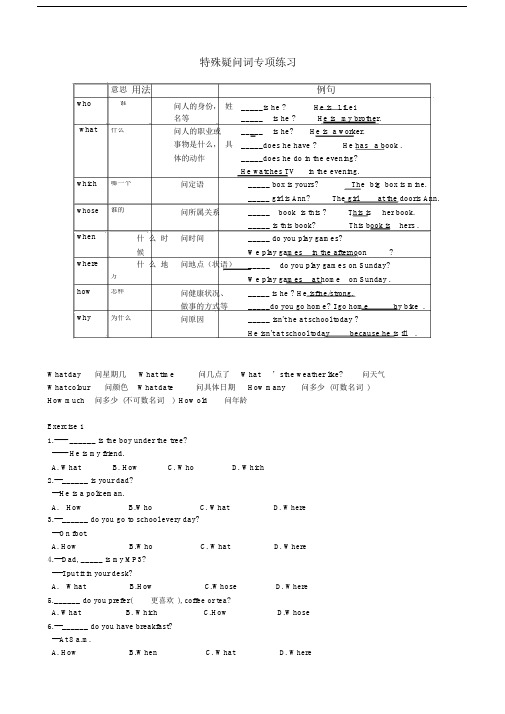
特殊疑问词专项练习用法 例句who whatwhichwhosewhen wherehowwhy问人的身份, 姓 _____is he ? He is LiLei名等 _____ is he ? He is my brother.问人的职业或 _____ is he?He is a worker.事物是什么, 具 _____does he have ?He has a book .体的动作_____does he do in the evening?He watches TVin the evening.问定语_____ box is yours? The big box is mine._____ girl is Ann? The girlat the dooris Ann. 问所属关系 _____ book is this ? This isher book._____ is this book? This book is hers .什 么 时 问时间_____ do you play games?候We play games in the afternoon?什 么 地问地点(状语)_____ do you play games on Sunday?We play games at home on Sunday .问健康状况、 _____ is he ? He isfine/strong.做事的方式等 _____do you go home? I go home by bike .问原因_____ isn't he at school today ?He isn't at school todaybecause he is ill .What day 问星期几What time 问几点了 What ’sthe weather like? 问天气What colour 问颜色What date问具体日期How many 问多少 (可数名词 )How much 问多少 (不可数名词 ) How old 问年龄Exercise 11.----- ______ is the boy under the tree? ------ He is my friend. A. WhatB. HowC. WhoD. Which2.---______ is your dad? ---He is a policeman. A. How B.Who C. What D. Where3.---______ do you go to school every day?---On foot. A. HowB.WhoC. WhatD. Where4.---Dad, _____ is my MP3? ----I put it in your desk? A. What B.How C.Whose D. Where5.______ do you prefer( 更喜欢 ), coffee or tea?A. WhatB. WhichC.HowD.Whose6.---______ do you have breakfast?---At 8 a.m.A. HowB.WhenC. WhatD. Where为什么 方怎样谁的哪一个 什么 谁意思Exercise 21、 A: _______ is the boy in blue?B:He’ s Mike.2 、 A: _______ pen is it?B:It’ s mine.3 、 A: _______ is the diary?4 、 A: _______ is the Chirstmas Day?5 、 A: _____ ______are the earphones?6 、 A: _____ ______ is the hairdryer?7 、 A: _____ ______ is it today?8 、 A: _____ ______ was it yesterday? B:It’ s under the chair.thB: It’ s on the 25of December. B:They are 25 yuan.B:It’ s blue.B:It’ s Sunday.B: It was the 13th of October.12 、 A:_______ one is fatter, the blue one or the red one? B: The blue one.13 、 A:_______ is your cousin? B: He ’ s 15 years old.14 、 A:_______ do you have dinner? B: At 6 o ’ clock.Exercise 3Challenges (挑战一下), Change theses sentences into special questions.(把下列句子改为特殊疑问句 )1.It was September 9th yesterday.2.They have supper at six in the evening.3.He works in the library.4.He is under the tree.5.The boy under the tree is his friend.6. The girl in a red coat is her sister.。

【发卷日期】2013年______月_______日【学生姓名】__________________________一、特殊疑问句的定义:用“特殊疑问词”引导的疑问句叫做“特殊疑问句”,朗读句子时用降调。
回答特殊疑问句时不能用yes或no而必须问什么就回答什么。
例如:Where'stherestaurant?哪里有餐厅?It’snearthestation.车站附近。
二、特殊疑问句的用法:对划线部分提问,可以用什么疑问词?1.对“地点,位置”提问,用“where”。
例如:TheyarestudyingChin eseinChina.→WherearetheystudyingChinese? 2.就“时间”提问,用“when”。
例如:ShecametoJapanin1990.→WhendidshecometoJapan?3.对“具体时刻、几点钟”提问,用“whattime”。
例如:Heoftengoestobedatten.→Whattimedoesheoftengotobed?4.对“谁”提问,用“who”(主格)或“whom”(宾格)。
例如:Thegirlisstandingatthestation.→Whoisstandingatthestation?TheyoftengohomewithTom.→Whom dotheyoftengohomewith?5.对“谁的(人或物)”提问,用“whose”。
例如:Iwillmeetmyfather.→Whosefatherwillyoumeet?6.对“年龄,多少岁”提问,用“howold”。
例如:Themanoverthereissixty.→Howoldisthemanoverthere?7.对“哪一个”提问,用“which”。
例如:Shelikesthenewski rt.→Whichskirtdoesshelike?8.对“颜色”提问,用“whatcolour”。
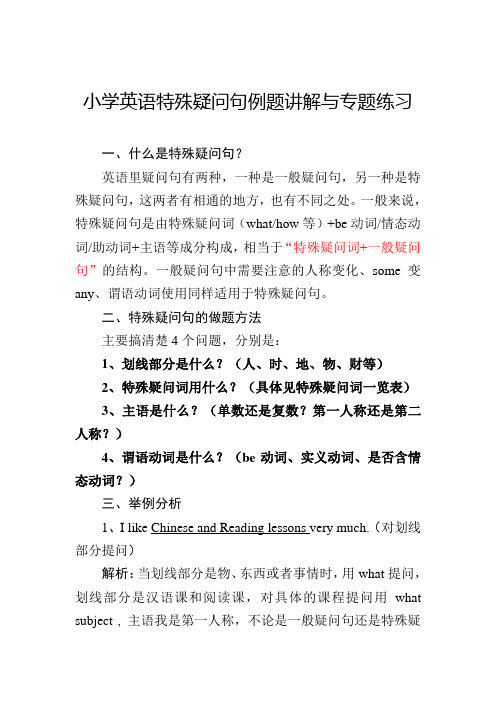
小学英语特殊疑问句例题讲解与专题练习一、什么是特殊疑问句?英语里疑问句有两种,一种是一般疑问句,另一种是特殊疑问句,这两者有相通的地方,也有不同之处。
一般来说,特殊疑问句是由特殊疑问词(what/how等)+be动词/情态动词/助动词+主语等成分构成,相当于“特殊疑问词+一般疑问句”的结构。
一般疑问句中需要注意的人称变化、some变any、谓语动词使用同样适用于特殊疑问句。
二、特殊疑问句的做题方法主要搞清楚4个问题,分别是:1、划线部分是什么?(人、时、地、物、财等)2、特殊疑问词用什么?(具体见特殊疑问词一览表)3、主语是什么?(单数还是复数?第一人称还是第二人称?)4、谓语动词是什么?(be动词、实义动词、是否含情态动词?)三、举例分析1、I like Chinese and Reading lessons very much.(对划线部分提问)解析:当划线部分是物、东西或者事情时,用what提问,划线部分是汉语课和阅读课,对具体的课程提问用what subject , 主语我是第一人称,不论是一般疑问句还是特殊疑问句,第一人称都要变成第二人称,谓语动词like是实义动词,需要引入助动词。
故答案为:What subjects do you like ?2、Our school is beautiful.(对划线部分提问)解析:当划线部分是形容词时,用how提问,主语是“我们的学校”,第一人称要变成第二人称,谓语动词是be动词。
故答案为:How is your school ?3、Lily went to the park last week. (对划线部分提问)解析:当划线部分是地点时,用where提问,当划线部分是时间时,用when提问,谓语动词是实义动词,引入助动词,由于是过去时态,所以用did引导。
所以改为:① Where did Lily go last week ? ②When did Lily go to the park?四、特殊疑问词一表通五、对划线部分提问1. Mike makes cars in a factory .(对划线部分提问)?2.Daniel has a lot of hobbies .(对划线部分提问)?3.His father is a writer . (对划线部分提问)?4.My sister likes dancing .(对划线部分提问)?5.The girl under the tree is my sister .(对划线部分提问)?6.My uncle can teach me Chinese .(对划线部分提问)?7.The pen costs me 10 yuan .(对划线部分提问)?8.Jack’s house is 1 km from our school .(对划线部分提问)?9.There are three people in my family .(对划线部分提问)?10.The girl is so beautiful .(对划线部分提问)?11.Mike often goes to school on foot .(对划线部分提问)?12.It’s 7 o’clock now .(对划线部分提问)?13.Mike plays table tennis three times a week .(对划线部分提问)?14.That man is my English teacher .(对划线部分提问)?15.My e-friend comes from the UK .(对划线部分提问)?lie and I will go to the library tomorrow .(对划线部分提问)?17.My parrot is yellow and green .(对划线部分提问)?18.He goes to bed because he is too tired .(对划线部分提问)?19 . Tomorrow is Wednesday .(对划线部分提问)?20 . We are going to Australia On September 1st.(对划线部分提问)?21 . The schoolbag is mine .(对划线部分提问)?22 . My grandmother is 76 years old .(对划线部分提问)?六、用特殊疑问词填空1、do you like best ? - I like go fishing best .2、do you like best ? - I like the green colour best .3、do you like best ? - I like Lily best.4、do you like best ? - I like that museum best .5、do you like ? - I like the tallest one .6、book do you like best ? - I like Tom’s book best .7、is your school? - My school is big and beautiful .8、do you play football ? - We play football every week .9、do you get up ? - I often get up at half past six in themorning .10、is your father? - My father is 36 years old .参考答案:五:1.where does Mike make cars?2.How many hobbies does David have ?3.What is his father job?/What does his father do ?4.What does your sister like ?5.Who is the girl under the tree ?6.What subject can your uncle teach ?7.How much is the pen ?8.How far is Jack’s house from your school ?9.How many people are there in your family?10.H ow is the girl ?11.H ow does Mike often go to school ?12.W hat time is it now ?13.H ow often does Mike play table tennis ?14.W ho is that man ?15.W here does your e-friend come from ?16.W hen will Millie and you go to the library ?17.W hat colour is your parrot ?18.W hy does he go to bed ?19.What day is tomorrow ?20.W hat date are your going to Australia?21.W hose schoolbag is it ?22.H ow old is your grandmother ?六、1.what 2.what colour 3.who 4.where 5.which 6.whose 7.how8.how often 9.when/what time 10.how old。
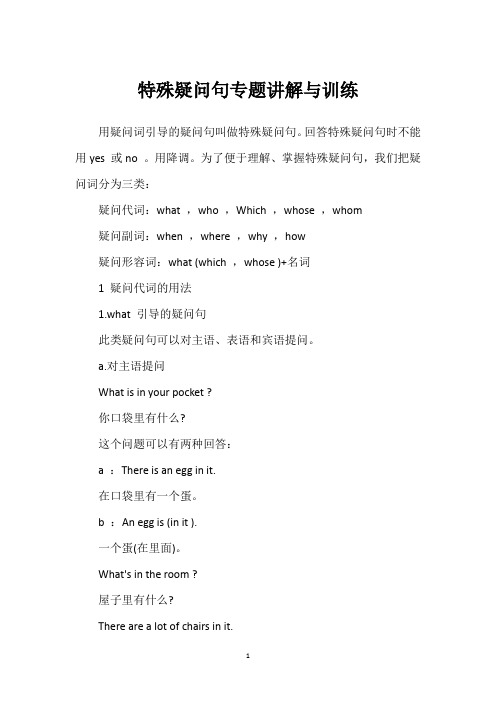
特殊疑问句专题讲解与训练用疑问词引导的疑问句叫做特殊疑问句。
回答特殊疑问句时不能用yes 或no 。
用降调。
为了便于理解、掌握特殊疑问句,我们把疑问词分为三类:疑问代词:what ,who ,Which ,whose ,whom疑问副词:when ,where ,why ,how疑问形容词:what (which ,whose )+名词1 疑问代词的用法1.what 引导的疑问句此类疑问句可以对主语、表语和宾语提问。
a.对主语提问What is in your pocket ?你口袋里有什么?这个问题可以有两种回答:a :There is an egg in it.在口袋里有一个蛋。
b :An egg is (in it ).一个蛋(在里面)。
What's in the room ?屋子里有什么?There are a lot of chairs in it.=A 1ot of chairs are in it.有许多椅子。
注意回答此句型的问题时,答句的单复数根据实际情况而定。
b.对宾语提问What did you buy ?你买了什么?I bought a bike.我买了辆自行车。
c.对表语提问What is this ?这是什么?It's a bench.这是一条长凳。
What is your mother ?你妈妈是干什么的?注意What is +人?此句型是问人的职业,一般译为“是干什么的?”She is a teacher.她是个老师。
2.Who ,whom ,whose 引导的疑问句此类疑问句可以对主语、表语和宾语提问。
Who broke the window ?(对主语提问)谁打破了窗户?who 可以对主语和表语提问。
whom 是who 的宾格,对宾语提问,但在口语中who 可以代替whom 。
Li Ming did.李明打破的。
Who is that woman ?(对表语提问)那个女人是谁?She is my mother.她是我妈妈。
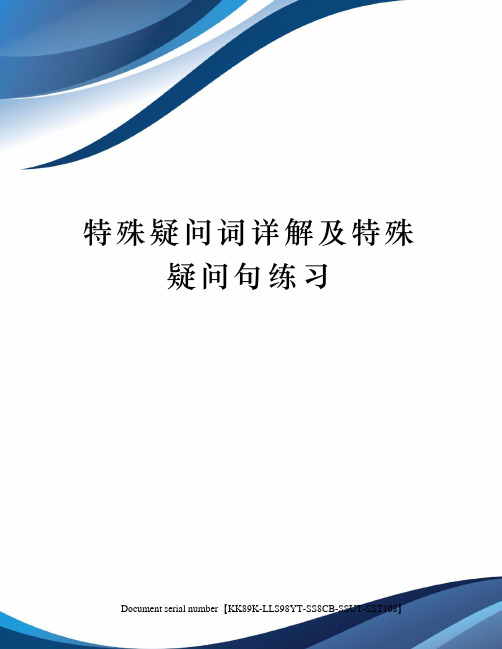
特殊疑问词详解及特殊疑问句练习Document serial number【KK89K-LLS98YT-SS8CB-SSUT-SST108】【发卷日期】2013年______月_______日【学生姓名】__________________________一、特殊疑问句的定义:用“特殊疑问词”引导的疑问句叫做“特殊疑问句”,朗读句子时用降调。
回答特殊疑问句时不能用yes或no而必须问什么就回答什么。
例如:Where'stherestaurant?哪里有餐厅?It’snearthestation.车站附近。
二、特殊疑问句的用法:对划线部分提问,可以用什么疑问词?1.对“地点,位置”提问,用“where”。
例如:TheyarestudyingChineseinChina.→WherearetheystudyingChinese?2.就“时间”提问,用“when”。
例如:ShecametoJapanin1990.→WhendidshecometoJapan?3.对“具体时刻、几点钟”提问,用“whattime”。
例如:Heoftengoestobedatten.→Whattimedoesheoftengotobed?4.对“谁”提问,用“who”(主格)或“whom”(宾格)。
例如:Thegirlisstandingatthestation.→Whoisstandingatthestation?TheyoftengohomewithTom.→Whomdotheyoftengohomewith?5.对“谁的(人或物)”提问,用“whose”。
例如:Iwillmeetmyfather.→Whosefatherwillyoumeet?6.对“年龄,多少岁”提问,用“howold”。
例如:Themanoverthereissixty.→Howoldisthemanoverthere?7.对“哪一个”提问,用“which”。
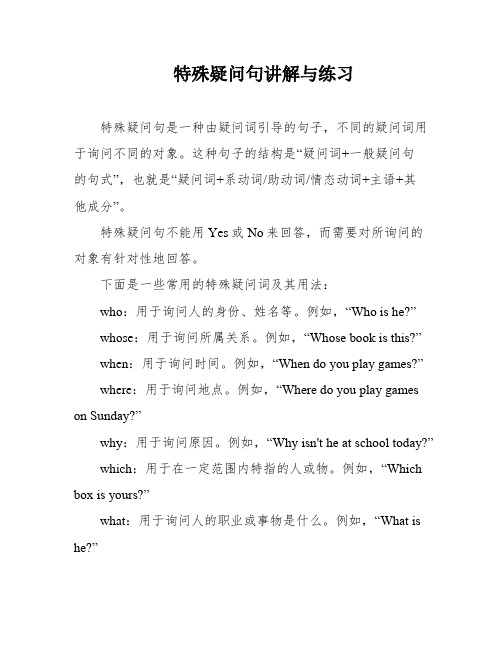
特殊疑问句讲解与练习特殊疑问句是一种由疑问词引导的句子,不同的疑问词用于询问不同的对象。
这种句子的结构是“疑问词+一般疑问句的句式”,也就是“疑问词+系动词/助动词/情态动词+主语+其他成分”。
特殊疑问句不能用Yes或No来回答,而需要对所询问的对象有针对性地回答。
下面是一些常用的特殊疑问词及其用法:who:用于询问人的身份、姓名等。
例如,“Who is he?”whose:用于询问所属关系。
例如,“Whose book is this?”when:用于询问时间。
例如,“When do you play games?”where:用于询问地点。
例如,“Where do you play games on Sunday?”why:用于询问原因。
例如,“Why isn't he at school today?”which:用于在一定范围内特指的人或物。
例如,“Which box is yours?”what:用于询问人的职业或事物是什么。
例如,“What is he?”what color:用于询问颜色。
例如,“What color is your skirt?”what time:用于询问时间,相当于“几点”。
例如,“What time do you play games?”what day:用于询问星期几。
例如,“What day is it today?”how:用于询问健康状况、做事的方式、程度等。
例如,“How is he?”(问健康状况)I ride my bike to go home。
How do you usually commute。
The river is about 100 meters wide。
How deep is the river。
What is your age。
He is ten years old。
How many boys are there in your class。
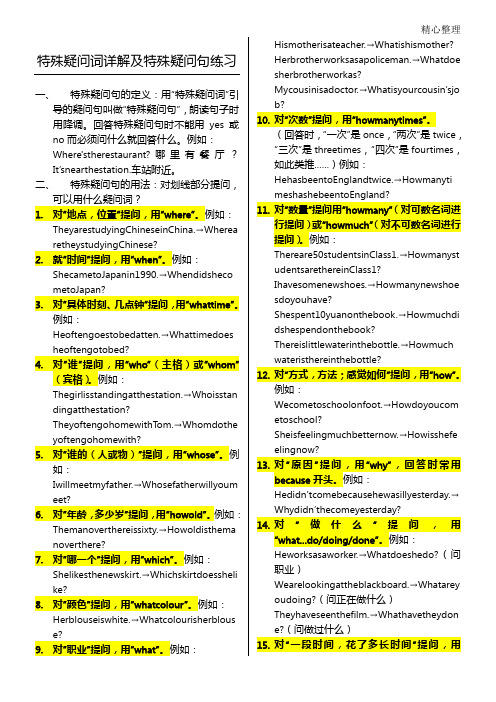
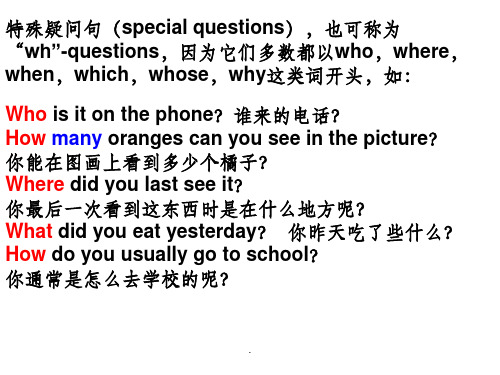
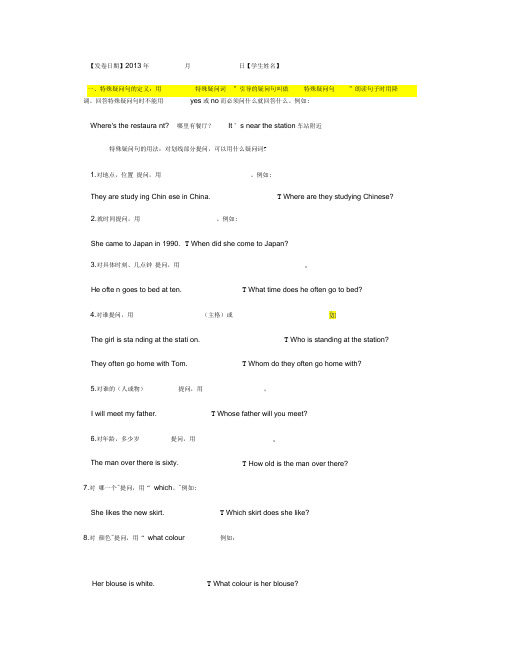
【发卷日期】2013年月 日【学生姓名】Her blouse is white. T What colour is her blouse?一、特殊疑问句的定义:用 特殊疑问词 ”引导的疑问句叫做 特殊疑问句 ”朗读句子时用降调。
回答特殊疑问句时不能用 yes 或no 而必须问什么就回答什么。
例如:Where's the restaura nt? 哪里有餐厅?It ' s near the station 车站附近特殊疑问句的用法:对划线部分提问,可以用什么疑问词?1.对地点,位置 提问,用。
例如:2.就时间提问,用。
例如:T When did she come to Japan?They are study ing Chin ese in China.T Where are they studying Chinese?She came to Japan in 1990. 3.对具体时刻、几点钟 提问,用He ofte n goes to bed at ten.T What time does he often go to bed?4.对谁提问,用(主格)或The girl is sta nding at the stati on. T Who is standing at the station?They often go home with Tom. T Whom do they often go home with?5.对谁的(人或物)提问,用I will meet my father. T Whose father will you meet?6.对年龄,多少岁提问,用The man over there is sixty. T How old is the man over there?7.对 哪一个"提问,用“ which 。
"例如: She likes the new skirt. 8.对 颜色"提问,用“ what colourT Which skirt does she like?例如:We are looking at the blackboard.9.对 职业"提问,用“ what 。
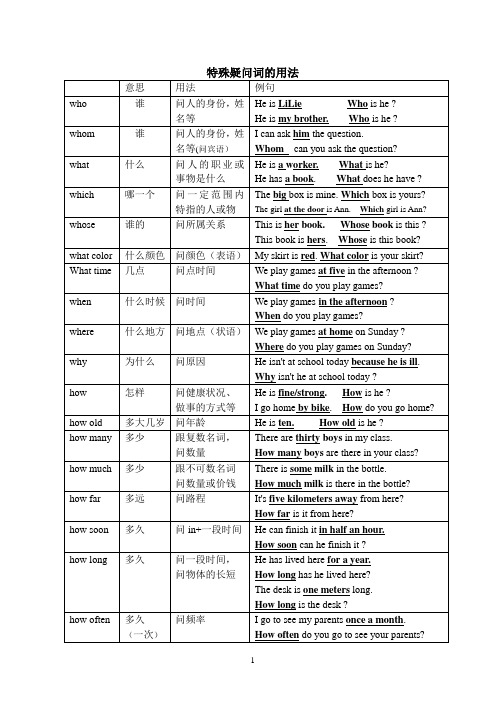
特殊疑问词的用法意思 who whom what which whose what color What time when where why how how old how many how much how far how soon how long 谁 谁 什么 哪一个 谁的 什么颜色 几点 什么时候 什么地方 为什么 怎样 多大几岁 多少 多少 多远 多久 多久 用法 问人的身份,姓 名等 问人的身份,姓 名等(问宾语) 问人的职业或 事物是什么 问一定范围内 特指的人或物 问所属关系 例句 He is LiLie He is my brother. Who is he ? Who is he ?I can ask him the question. Whom can you ask the question? He is a worker. He has a book. What is he? What does he have ?Which girl is Ann?The big box is mine. Which box is yours?The girl at the door is Ann.This is her book. Whose book is this ? This book is hers. Whose is this book? We play games at five in the afternoon ? What time do you play games? We play games in the afternoon ? When do you play games?问颜色(表语) My skirt is red. What color is your skirt? 问点时间 问时间问地点(状语) We play games at home on Sunday ? Where do you play games on Sunday? 问原因 问健康状况、 做事的方式等 问年龄 跟复数名词, 问数量 跟不可数名词 问数量或价钱 问路程 问 in+一段时间 问一段时间, 问物体的长短 He isn't at school today because he is ill. Why isn't he at school today ? He is fine/strong. I go home by bike. He is ten. How is he ? How do you go home?How old is he ?There are thirty boys in my class. How many boys are there in your class? There is some milk in the bottle. How much milk is there in the bottle? It's five kilometers away from here? How far is it from here? He can finish it in half an hour. How soon can he finish it ? He has lived here for a year. How long has he lived here? The desk is one meters long. How long is the desk ? I go to see my parents once a month. How often do you go to see your parents?1how often多久 (一次)问频率对画线部分提问,除了要注意选择正确的疑问词外,还要注意语序的运用。
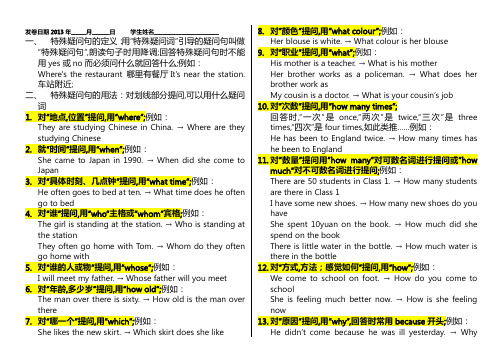
发卷日期2013年______月_______日学生姓名__________________________一、特殊疑问句的定义:用“特殊疑问词”引导的疑问句叫做“特殊疑问句”,朗读句子时用降调;回答特殊疑问句时不能用yes或no而必须问什么就回答什么;例如:Where's the restaurant 哪里有餐厅It’s near the station.车站附近;二、特殊疑问句的用法:对划线部分提问,可以用什么疑问词1.对“地点,位置”提问,用“where”;例如:They are studying Chinese in China. → Where are they studying Chinese2.就“时间”提问,用“when”;例如:She came to Japan in 1990. → When did she come to Japan3.对“具体时刻、几点钟”提问,用“what time”;例如:He often goes to bed at ten. → What time does he often go to bed4.对“谁”提问,用“who”主格或“whom”宾格;例如:The girl is standing at the station. → Who is standing at the stationThey often go home with Tom. → Whom do they often go home with5.对“谁的人或物”提问,用“whose”;例如:I will meet my father. → Whose father will you meet6.对“年龄,多少岁”提问,用“how old”;例如:The man over there is sixty. → How old is the man over there7.对“哪一个”提问,用“which”;例如:She likes the new skirt. → Which skirt does she like 8.对“颜色”提问,用“what colour”;例如:Her blouse is white. → What colour is her blouse9.对“职业”提问,用“what”;例如:His mother is a teacher. → What is hi s motherHer brother works as a policeman. → What does her brother work asMy cousin is a doctor. → What is your cousin’s job10.对“次数”提问,用“how many times”;回答时,“一次”是once,“两次”是twice,“三次”是three times,“四次”是four times,如此类推……例如:He has been to England twice. → How many times has he been to England11.对“数量”提问用“how many”对可数名词进行提问或“howmuch”对不可数名词进行提问;例如:There are 50 students in Class 1. → How many students are there in Class 1I have some new shoes. → How many new shoes do youhaveShe spent 10yuan on the book. → How m uch did she spend on the bookThere is little water in the bottle. → How much water is there in the bottle12.对“方式,方法;感觉如何”提问,用“how”;例如:We come to school on foot. → How do you come to schoolShe is feeling much better now. → How is she feeling now13.对“原因”提问,用“why”,回答时常用because开头;例如:He didn’t come because he was ill yesterday.→ Whydidn’t he come yesterday14.对“做什么”提问,用“what…do/doing/done”;例如:He works as a worker. → What does he do问职业We are looking at the blackboard. → What are you doing问正在做什么They have seen the film. → What have they done问做过什么15.对“一段时间,花了多长时间”提问,用“how long”;常跟一般现在时连用;回答时,for+时间段,since+时间点;例如:We have stayed here for six years. → How long have you stayed hereHe has worked in Beijing since 1980. → How long has he worked in Beijing16.对“频度、频率”提问,用how often;回答时,经常会用到“频度副词”:always总是,usually通常,often经常,sometimes有时,seldom很少,never从不例如:She is late for school once a week. → How often is she late for schoolWe sometimes get up at 10:00. → How often do you get up at 10:0017.对“将来要做的某事”提问,用“how soon”;常和“一般将来时”连用例如:Lucy will be back in four days. → How soon will Lucy be back18.对“高度”提问用“how tall”表示人或“how high”表示物;例如:The man is 2 metres tall. → How tall is the manThe hill is 300 metres high. → How high is the hill19.对“重量”提问,用“how heavy”;对“大小”提问,用“how big”;例如:The elephant weighs 3 tons. → How heavy does the elephant weighThe stone is about 11 metres long, 5 metres wide, 7 metres high.→ How big is the stone20.对“物品长度,”提问,用“how long”;对“物品宽度”提问,用“how wide”;例如:The desk is 4 metres long. → How long is the deskThe river is 100 metres wide. → How wide is the river 21.对“星期几”提问,用“what day”;欧美国家习惯把星期天视作每周第1天例如:Today is Friday. → What day is today22.对“日期”提问,用“what…the date”;英式的日期表示方式:日/月/年;美式的日期表示方式:月/日/年例如:Yesterday was 1 July, 1995.英式或Yesterday was July 1, 1995.美式→ What was the date yesterday23.对“距离”提问,用“how far”;有时需用“花多长时间乘搭某种交通工具”作为表示“距离”的方式,此时切勿与“how long”搞混例如:It’s 2 miles from my home to school.→ How far is it from your home to school24.对“尺寸,尺码”提问,用“what size”;例如:I want size 42 shoes.→ What size shoes do you want25.对“天气状况”提问,用“What…the weather like”或Today is rainy. → What is the weather like today 或How is the weather today26.对“天气的温度”提问,用以下几种方式提问:1What temperature is it today2How many degrees is it today3What is the temperature today三、如何把陈述句改为特殊疑问句对句中划线部分提问11. A: ___________________________ do you go home B: By bus.12. A: ___________________________ is nine and two B: Eleven.13. A: ___________________________ water is there in the bottle B: A little.14. A: ___________________________ does your aunt do B: She isa nurse.15. A: ___________________________ crossed the river fast B: Joe did.16. A: ___________________________ did you go to Beijing B: Last summer.1. ___________________ are those new brushes They are orange.2. ___________________ are the socks on your feet They are 38.3. ___________________ is your aunt going tomorrow Washington .4. ___________________ grass do the cows eat in the morning 20kilograms.5. _________________ do you go to school every day I go to school by subway.6. _________________ lady is your teacher The lady in gray is our teacher.7. _________________ is your uncle The man in a purple T-shirt is our classmate.8. _________________ is i t by your watch, Kelly It’s eighteen past seven.9. _________________ fruit shops are there in the street There are twelve.10. _________________ does your sister like best She likes playing the guitar.练习3用正确的特殊疑问词填空;1._________________ is that pretty girl She is my sister.2._________________ do you play basketball I play it once aweek.3._________________ do you go to school I go to school fromMonday to Friday.4._________________ are you from I'm from Changchun.5._________________ is it from your home to scho ol It’s about10 minutes’ walk.6._________________ is Lily She’s about seventeen.7._________________ is twelve and eighteen It’s thirty.8._________________ book is it It’s Mike’s.9._________________ do you watch TV I watch TV every day.10._________________ does Philip go to France He goes thereby air.11._________________ do Jo and Paul do Jo is a doctor andPaul is a manager.12._________________ will your uncle come back He will beback in an hour.13._________________ does the pig weigh It’s ninety kilos.14._________________ do Jim and Wendy play ball They playball in the afternoon.15._________________ will you finish your homework In threehours.16._________________ has a beautiful flower John has abeautiful flower.17._________________ have you been in Guangzhou I’ve beenhere for three years.18._________________ are you going to arrive Thirty seconds.19._________________ are they They are my parents.20._________________ do you want to be when you grow up Iwant to be a singer.21._________________ people are there in John’s family T hereare five.22._________________ are Jack and Tom They are behind you.23._________________ is it from here to the airport It’s nearlyhour’s drive.24._________________ is that red sweater It’s four hundred andforty-nine yuan.25._________________ does Simon’s c ousin work as She worksas an engineer.26._________________ do you clean up your bedroom Abouttwice a month.27._________________ is it from Beijing to Shanghai It’s morethan 1000km.28._________________ have you been like this I’ve been likethis for 3 days, doctor.29._________________ is my mother She is in the living room.30._________________ do Ken’s grandparents own They own arestaurant.31._________________ does he run He runs in the playground.32._________________ students are there in your class Thereare fifty-one.33._________________ is the Moon from the Earth lightseconds.34._________________ have you stayed in Italy I have stayed inItaly for six years.35._________________ will he finish the test He’ll finish his testin half an hour.练习4先将下列句子变成一般疑问句,然后对划线部分提问;1.①The supermarket is near the school. ②Thesupermarket is near the school. 变一般疑问句_______________________________________________________________ ________________________________________________________________________________________________ _______________________________________________就划线部分提问①____________________________________________________________ ______________________________________________________________________________________________ _______________________________________________就划线部分提问②____________________________________________________________ ______________________________________________________________________________________________ _______________________________________________2.①Tim can speak French very well. ②Tim canspeak French very well.变一般疑问句_______________________________________________________________ ________________________________________________________________________________________________ _______________________________________________就划线部分提问①____________________________________________________________ ______________________________________________________________________________________________ _______________________________________________就划线部分提问②____________________________________________________________ _____________________________________________________________________________________________________________________________________________3.①I often watch TV on Sundays. ②I oftenwatch TV on Sundays.变一般疑问句_______________________________________________________________ ________________________________________________________________________________________________ _______________________________________________就划线部分提问①____________________________________________________________ ______________________________________________________________________________________________ _______________________________________________就划线部分提问②____________________________________________________________ ______________________________________________________________________________________________ _______________________________________________4.①Her father will buy her a new bike. ②Her father willbuy her a new bike.变一般疑问句_______________________________________________________________ ________________________________________________________________________________________________ _______________________________________________就划线部分提问①____________________________________________________________ ______________________________________________________________________________________________ _______________________________________________就划线部分提问②____________________________________________________________ ______________________________________________________________________________________________ _______________________________________________5.①Joe is playing tennis with his friend. ②Joe is playingtennis with his friend.变一般疑问句_______________________________________________________________ ________________________________________________________________________________________________ _______________________________________________就划线部分提问①____________________________________________________________ ______________________________________________________________________________________________ _______________________________________________就划线部分提问②____________________________________________________________ ______________________________________________________________________________________________ _______________________________________________6.①Lily was reading at nine yesterday. ②Lily wasreading at nine yesterday.变一般疑问句_______________________________________________________________ ________________________________________________________________________________________________ _______________________________________________就划线部分提问①____________________________________________________________ _____________________________________________________________________________________________________________________________________________就划线部分提问②____________________________________________________________ ______________________________________________________________________________________________ _______________________________________________7.①Jim asked me to look after his dog. ②Jim asked meto look after his dog.变一般疑问句_______________________________________________________________ ________________________________________________________________________________________________ _______________________________________________就划线部分提问①____________________________________________________________ ______________________________________________________________________________________________ _______________________________________________就划线部分提问②____________________________________________________________ ______________________________________________________________________________________________ _______________________________________________8.①Tom has lived here for 2 years. ②Tom haslived here for 2 years.变一般疑问句_______________________________________________________________ ________________________________________________________________________________________________ _______________________________________________就划线部分提问①____________________________________________________________ _______________________________ _______________________________________________________________ _______________________________________________就划线部分提问②____________________________________________________________ ______________________________________________________________________________________________ _______________________________________________9.①I had played tennis for 2 hours. ②I hadplayed tennis for 2 hours.变一般疑问句_______________________________________________________________ ________________________________________________________________________________________________ _______________________________________________就划线部分提问①____________________________________________________________ ______________________________________________________________________________________________ _______________________________________________就划线部分提问②____________________________________________________________ ______________________________________________________________________________________________ _______________________________________________答案:一、1.What time2.Where3.How far4.Who5.How6.How many7.Whose8.Whose9.Why10.How old11.How12.What13.How much14.What15.Who16.When二、1.What colour2.What size3.Where4.How much5.How6.Which7.Which8.What time9.How many10.What三、1.Who2.How often3.When4.Where5.How far6.How old7.What8.Whose9.How often10.How11.What12.How soon13.How heavy14.When15.How soon16.Who17.How long18.How soon19.Who20.What21.How many22.Where23.How far24.How much 25.What26.How often27.How far28.How long29.Where30.What31.Where32.How many33.How far34.How long35.How soon四、略。
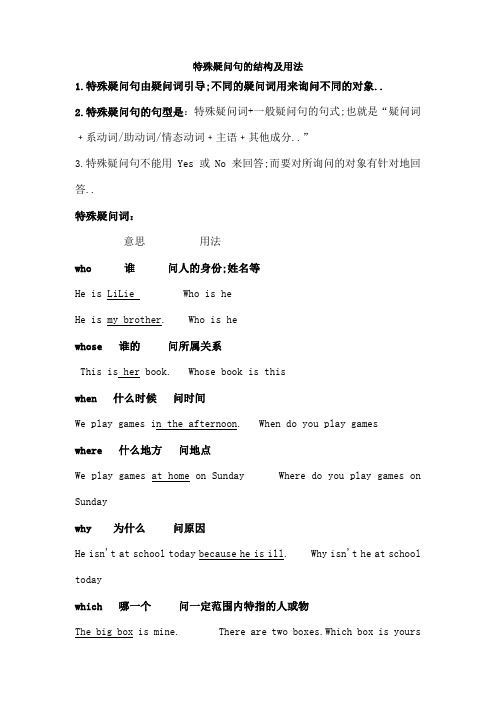
特殊疑问句的结构及用法1.特殊疑问句由疑问词引导;不同的疑问词用来询问不同的对象..2.特殊疑问句的句型是:特殊疑问词+一般疑问句的句式;也就是“疑问词﹢系动词/助动词/情态动词﹢主语﹢其他成分..”3.特殊疑问句不能用Yes 或No 来回答;而要对所询问的对象有针对地回答..特殊疑问词:意思用法who 谁问人的身份;姓名等He is LiLie Who is heHe is my brother. Who is hewhose 谁的问所属关系This is her book. Whose book is thiswhen 什么时候问时间We play games in the afternoon. When do you play gameswhere 什么地方问地点We play games at home on Sunday Where do you play games on Sundaywhy 为什么问原因He isn't at school today because he is ill. Why isn't he at school todaywhich 哪一个问一定范围内特指的人或物The big box is mine. There are two boxes.Which box is yoursWhich apple do you like I like the smaller one.what 什么问人的职业或事物是什么He is a worker. What is heHe has a book. What does he havewhat color 什么颜色问颜色My skirt is red. What color is your skirtwhat time 几点问时间 =whenWe play games at five in the afternoon What time do you play gameswhat day 星期几问星期几What day is it today It is Monday.how 怎样问健康状况、做事的方式、程度等He is fine/strong. How is he 问健康状况I go home by bike. How do you go home 问做事的方式The river is 100 meters. How deep is the river 问程度how old 几岁问年龄He is ten. How old is hehow many 多少跟可数名词复数;问数量There are thirty boys in my class. How many boys are there in your classhow much 多少/多少钱跟不可数名词;问数量或价钱There is some milk in the bottle. How much milk is there in thebottle 问数量How much is the dress It’s 50 yuan.问价钱how far 多远问路程It's five kilometers away from here How far is it from here 注意:特殊疑问句的回答不能用Yes/No;要有是在的回答..练习题一、从A栏中选出与B栏问题对应的答句;并用线连起来..A B1、What`s your name It`s a book.2、What class are you in My name is Betty.3、Where are you from I`m NO.2.4、What`s this in English I`m in Class Two.5、What`s one and one It`s two.6、What`s your number I am from China.二、用疑问词填空..1、---- are you ----I`m a driver.2、--- are you ---I`m fine.3、--- are you ---I`m ten.4、-- are you ----I`m Alice.5、-- are you ---I`m in the office.6、-- is it ---It`s red.7、-- is it -- It`s a banana.8、-- books are there on the desk –There are two books.9、-- are the books ---They are twenty yuan.10、-- is your birthday生日–On May 2nd.三、就划线部分提问1、He often has lunch午饭 in the factory.he often lunch3、He hurt his leg last Sunday.he his leg4、I got up at six this morning.you up this morning5、I didn`t go to school because I had a bad cold.you go to school6、The girl in a red coat is my sister..is your sister7、He is 159cm tall.is he四.选择题1. Excuse me ______ is the bookshop —It’s over there.A. howB. whatC. whereD. who2. ______ is a pencil —About five yuan .A. How oldB. How manyC. How muchD. How often3. ______ are you going —I’m going to the librar y图书馆.A. WhoB. WhichC. WhatD. Where4. ______ tea do you have —Two cups.A. How manyB. How muchC. HowD. Which5. ______ —The one behind the tree.A. Whose girlB. Who’s that girlC. Which girlD. Where’s the girl一、就划线部分提问1.They buy a new bike.____________________________________________________2.She is a teacher .____________________________________________________3.She is my teacher.____________________________________________________4.It is my coat .____________________________________________________5.I get up at six .____________________________________________________6.I am from Hubei .____________________________________________________7.I go to school late because因为I get up late.____________________________________________________8. My bag is red .______________________________________________________9. The book is Li Hua’s.______________________________________________________ 10. I like English best.______________________________________________________ 11. They are five yuan .______________________________________________________二、用合适的词填空1._______________ is this It’s a rubber.2._____ _______ rubbers are there in the pencilbox3._____ _______ is your brother He’s nine.4.________ are they They are cows.5. _______ are you I’m fine.6. _______ do you feel We are happy.7.________ is your father He is a teacher8.________ does he go to school He goes to school by bus.9.________ are the ducks They are on the river.10. ______ is his name He is Martin.11. _______ ________ new books have you got Five.12._______ ________ is the tree It’s gree n.13. _______coats are these Mary’s.14. _______ is on the desk There is a glass.三、按要求写句子1. Do you often play football after school 肯定回答2. I have many books. 改为否定句3. Gao Shan’s sister likes playing table tennis 改为否定句4. She lives in a small town near New York. 改为一般疑问句5. I watch TV every day. 改为一般疑问句6. David has got a goal. 改为一般疑问句7. Nancy doesn’t run fast 肯定句8. My dog runs fast.否定句:一般疑问句:9. Mike has two letters for him.一般疑问句:否定句:10. I usually经常 play football on Friday afternoon.否定句:一般疑问句:划线提问。
一、特殊疑问句的定义:用“特殊疑问词”引导的疑问句叫做“特殊疑问句”,朗读句子时用降调。
回答特殊疑问句时不能用yes或no而必须问什么就回答什么。
例如:Where's the restaurant? 哪里有餐厅?It’s near the station. 车站附近。
二、特殊疑问句的用法:对划线部分提问,可以用什么疑问词?1.对“地点,位置”提问,用“where”。
例如:They are studying Chinese in China. → Where are they studying Chinese?2.就“时间”提问,用“when”。
例如:She came to Japan in 1990. → When did she come to Japan?3.对“具体时刻、几点钟”提问,用“what time”。
例如:He often goes to bed at ten. → What time does he often go to bed?4.对“谁”提问,用“who”(主格)或“whom”(宾格)。
例如:The girl is standing at the station. → Who is st anding at the station?They often go home with Tom. → Whom do they often go home with?5.对“谁的(人或物)”提问,用“whose”。
例如:I will meet my father. → Whose father will you meet?6.对“年龄,多少岁”提问,用“how old”。
例如:The man over there is sixty. → How old is the man over there?7.对“哪一个”提问,用“which”。
例如:She likes the new skirt. → Which skirt does she like?8.对“颜色”提问,用“what colour”。
例如:Her blouse is white. → What colour is her blouse?9.对“职业”提问,用“what”。
例如:His mother is a teacher. → What is his mother?Her brother works as a policeman. → W hat does her brother work as?My cousin is a doctor. → What is your cousin’s job?10.对“次数”提问,用“how many times”。
(回答时,“一次”是once,“两次”是twice,“三次”是three times,“四次”是four times,如此类推……)例如:He has been to England twice. → How many times has he been to England? 11.对“数量”提问用“how many”(对可数名词进行提问)或“how much”(对不可数名词进行提问)。
例如:There are 50 students in Class 1. → How many students are there in Class 1?I have some new shoes. → How many new shoes do you have?She spent 10yuan on the book. → How much did she spend on the book?Ther e is little water in the bottle. → How much water is there in the bottle? 12.对“方式,方法;感觉如何”提问,用“how”。
例如:We come to school on foot. → How do you come to school?She is feeling much better now. → How is she feeling now?13.对“原因”提问,用“why”,回答时常用because开头。
例如:He didn’t come because he was ill yesterday.→ Why didn’t he come yesterday?14.对“做什么”提问,用“what…do/doing/done”。
例如:He works as a worker. → What does he do?(问职业)We are looking at the blackboard. → What are you doing?(问正在做什么)They have seen the film. → What have they done?(问做过什么)15.对“一段时间,花了多长时间”提问,用“how long”。
(常跟一般现在时连用。
回答时,for+时间段,since+时间点。
)例如:We have stayed here for six years. → How long have you stayed here?He has worked in Beijing since 1980. → How long has he worked in Beijing? 16.对“频度、频率”提问,用how often。
(回答时,经常会用到“频度副词”:always总是,usually通常,often经常,sometimes有时,seldom很少,never从不)例如:She is late for school once a week. → How often is she late for school?We sometimes get up at 10:00. → How often do you get up at 10:00?17.对“将来要做的某事”提问,用“how soon”。
(常和“一般将来时”连用)例如:Lucy wil l be back in four days. → How soon will Lucy be back?18.对“高度”提问用“how tall”(表示人)或“how high”(表示物)。
例如:The man is 2 metres tall. → How tall is the man?..The hill is 300 metres high. → How high is the hill?19.对“重量”提问,用“how heavy”;对“大小”提问,用“how big”。
例如:The elephant weighs 3 tons. → How heavy does the elephant weigh?The stone is about 11 metres long, 5 metres wide, 7 metres high.→ How big is the stone?20.对“物品长度,”提问,用“how long”;对“物品宽度”提问,用“how wide”。
例如:The desk is 4 metres long. → How long is the desk?The river is 100 metres wide. → How wide is the river?21.对“星期几”提问,用“what day”。
(欧美国家习惯把星期天视作每周第1天)例如:Today is Friday. → What day is today?22.对“日期”提问,用“what…the date”。
(英式的日期表示方式:日/月/年;美式的日期表示方式:月/日/年)例如:Yesterday was 1 July, 1995.(英式)或Yesterday was July 1, 1995.(美式)→ What was the date yesterday?23.对“距离”提问,用“how far”。
(有时需用“花多长时间乘搭某种交通工具”作为表示“距离”的方式,此时切勿与“how long”搞混)例如:It’s 2 miles from my home to school.→ How far is it from your home to school?24.对“尺寸,尺码”提问,用“what size”。
例如:I want size 42 shoes.→ What size shoes do you wan t?25.对“天气状况”提问,用“What…the weather like?”或“How…the weather”。
例如:Today is rainy. → What is the weather like today? 或How is the weather today?26.对“天气的温度”提问,用以下几种方式提问:(1)What temperature is it today?(2)How many degrees is it today?(3)What is the temperature today?【练习1】选词填空。
(可以重复使用方框内的词)..1. A: ___________________________ is it? B: It’s half past six.2. A: ___________________________ is Mary from? B: America.3. A: ___________________________ is your school from here? B: 5 kilometers.4. A: ___________________________ is that girl? B: She’s my classmate, Linda.5. A: ___________________________ are you? B: Fine, thanks.6. A: ___________________________ pencils do you have? B: I have three.7. A: ___________________________ ball is this? B: It’s Peter’s.8. A: ___________________________ boy is Billy? B: That fat boy.9. A: ___________________________ don’t you like mice? B: They are too dirty.10. A: ___________________________ is your brother? B: He’s ten.11. A: ___________________________ do you go home? B: By bus.12. A: ___________________________ is nine and two? B: Eleven.13. A: ___________________________ water is there in the bottle? B: A little.14. A: ___________________________ does your aunt do? B: She is a nurse.15. A: ___________________________ crossed the river fast? B: Joe did.16.A: ___________________________ did you go to Beijing? B: Last summer.1. ___________________ are those new brushes? They are orange.2. ___________________ are the socks on your feet? They are 38.3. ___________________ is your aunt going tomorrow? Washington D.C.4. ___________________ grass do the cows eat in the morning? 20kilograms.5. _________________ do you go to school every day? I go to school by subway.6. _________________ lady is your teacher? The lady in gray is our teacher.7. _________________ is your uncle? The man in a purple T-shirt is our classmate. 8. _________________ is it by your watch, Kelly? It’s eighteen past seven.9. _________________ fruit shops are there in the street? There are twelve.10. _________________ does your sister like best? She likes playing the guitar.【练习3】用正确的特殊疑问词填空。